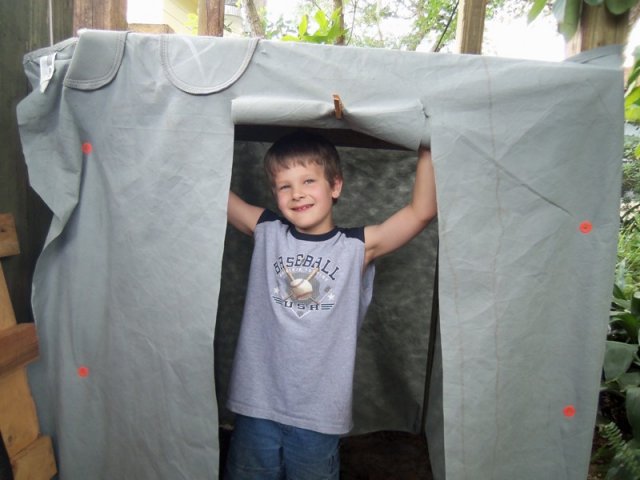Study finds coffee-drinkers live longer
The bad news? Lots of cream and sugar could negate the effect.
The good news? Enjoy your coffee guilt-free. At least the coffee helps negate the effect of the cream and sugar. :) And remember, stress and guilt are bad for you, too!
Florida gets all too much press for crazy happenings, so it's about time another state took the spotlight. Was it another school shooting that put Cascade High School in Hendricks County, Indiana, in the headlines? Nope. The newsworthy offense was a senior prank involving the deadly ... Post-It note! (H/T Free-Range Kids) Actually, the offense was on the part of the school administrators, who so far have suspended over 50 students, either for participating in the prank or for protesting the school's draconian response.
For years, MIT and Caltech have known that inventive, harmless pranks are a sign of an intelligent, creative student body. I think we can guess what schools the administrators did NOT graduate from—though maybe the helpful janitor (Frazz?) did.
Until Janet wrote a post that tops everything, this celebration of mothers from Lenore Skenazy was my favorite Mother's Day article. It's still great. I present some excerpts, with love, for all of my favorite mothers.
Time out from America’s favorite spectator sport: Mommy bashing. Mommies who “ignore” their kids. Mommies who “smother” their kids. Mommies who do what mommies have done since the beginning of time—their gosh-darn best. And yet, according to some onlooker somewhere (often one with air time to fill), that’s just not good enough.
We worry that one false move—a harsh word, a broken promise, perhaps a non-Paul Newman sandwich cookie—could cause a lifetime of pain. This worry is reinforced by a tsunami of parenting “resources” telling moms how to do everything just right: the right books, words, classes. I’ve seen whole articles on which sand toys to buy. The corollary is blame: If moms don’t do all those things (and spend all that time and waste all that money), their kids will be losers. And it’s all their fault.
That message is why mothers are getting the short end of the rattle. It’s a message that says there’s some secret recipe for raising great kids and anyone not following the recipe is doing it WRONG.
But you know what? Most moms, whether working or not, breastfeeding or not, are doing a great job. They hug their children. They kiss the boo-boo, they get the kids fed. And if it’s a Hot Pocket instead of broccoli rabe…so what?
There ISN’T a secret recipe for childrearing, there’s only the basic ingredient: Love. Most moms have it in spades. It’s who they are. So don’t keep telling them what they’re doing wrong.
Thank them for getting the biggest thing right.
Permalink | Read 2496 times | Comments (2)
Category Children & Family Issues: [first] [previous] [next] [newest]
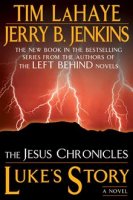 Luke's Story by Tim LaHaye and Jerry B. Jenkins (Putnam Praise, 2009)
Luke's Story by Tim LaHaye and Jerry B. Jenkins (Putnam Praise, 2009)
Luke's Story, the second book of LaHaye and Jenkins' Jesus Chronicles, uses the Bible, extra-biblical sources, and a lot of imagination to tell a reasonably credible story about the author of the Gospel of Luke. I found it more interesting than Mark's Story, though it suffers from many of the same defects. It's still seems like cheating that the authors get so much of their word count by lifting passages straight from the Bible, and their denominational slant is annoying. Worse, it lacks a first-century feel. I'm not sure I'd recognize an authentic setting, but I know the characters are spouting modern language, theology, and attitudes. Somehow I doubt that first-century worship looked quite so much like a modern American Baptist service....
However, there's more "story" to this book than there was to Mark's Story, which made it more enjoyable to read.
It was almost an idyllic scene: Three adults, eight children—four boys, four girls, ages 9, 8, 7, 5, 3, 3, 14 months, and 6 months—and one playground all to ourselves.
Well, almost all to ourselves. As the children happily ran back and forth across the grounds, it was more than a little annoying to remind them to watch out for the maintenance cart that came back again and again to ... to what?
The first time, the driver was apparently cleaning up branches from a recent storm, though he spent most of his time making worried comments about the exuberantly-climbing 14-month-old and glaring at the three adults who clearly weren't doing their duty in keeping her off the dangerous equipment. "There's an open space up there she could fall through, you know!" Yep, she could have fallen, I suppose, but she's part monkey, part mountain goat, and part bulldozer, so none of us saw any reason to spoil her fun. "Open space" or not, this playground is as safe as it can get without being of no use at all. Since the days when our children played there, we've lost the merry-go-round, the high, curly slide, and a lot of climbing equipment that was far more interesting ("dangerous") than that which replaced it.
The boys had ridden their scooters into the park, and dropped them right on the sidewalk as they ran off to play on the equipment. We'd left the scooters where they lay, because no one else was in the park to be bothered by them. When the maintenance cart came by, I quickly moved them out of his way. "Do you know whose scooters those are?" "Yes; they're ours." "Riding scooters in the park is forbidden." "Okay, I'll let the kids know." We meekly obeyed, though I can't imagine why he found it necessary to enforce the rule. Did I mention we were the only ones in the park?
Finally, the man drove away. But like the famous cat, he kept coming back. Driving slowly through the park, peering suspiciously at the children's antics, then leaving, only to repeat the process a few minutes later. In other circumstances I would have been tempted to call the police! But I'm sure he only meant well, and just wanted to be available when one of the frolicking youngsters suffered an injury, since the adults were clearly irresponsible, chatting away among themselves while the children chased each other up and down and all around.
Everyone had a wonderful time—except possibly the maintenance man, and who knows? maybe he was satisfied in a perverse sort of way for having prevented a scraped-knee scooter injury. But the experience did leave me slightly disturbed.
Reading the Free-Range Kids blog, I've heard plenty of stories of how schools, governments, playgrounds, social service agencies, and other institutions have joined "helicopter" parents in a culture of fear that deprives today's children of the opportunities they need to develop into strong, competent, independent adults. But this was my first personal experience with the phenomenon, and it was somewhat of a shock.
Permalink | Read 2945 times | Comments (1)
Category Children & Family Issues: [first] [previous] [next] [newest] Everyday Life: [first] [previous] [next] [newest]
The materials: We bought a couple of posts and a second hammer, but the rest of the materials were scrounged or donated by neighbors.
The labor force: Jonathan, Noah, Faith, and Dad-o.
The experience: Priceless.
Video tour of the fort. Even Faith can climb up the ladder to the top, though she hasn't tried the Jump Line yet.
Permalink | Read 2927 times | Comments (7)
Category Everyday Life: [first] [previous] [next] [newest]
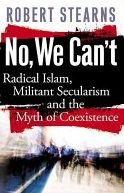 No, We Can't: Radical Islam, Militant Secularism, and the Myth of Coexistence by Robert Stearns (Chosen, 2011)
No, We Can't: Radical Islam, Militant Secularism, and the Myth of Coexistence by Robert Stearns (Chosen, 2011)
I received this book for review under false pretenses, but it was my fault entirely. This was the blurb that caught my eye:
The world is shifting, and a war for world domination is raging between radical Islam, militant secularism and Judeo-Christianity. But what does it mean for you—and why should you care? With clarity and astonishing depth, Robert Stearns lays out the dire ramifications of this coming culture clash for Christians. Based on years of global outreach, he shows what believers can and must do. The tipping point in global culture is upon us. What role will you play?
Normally, words like "a war for world domination" wouldn't encourage me to pick up a book. But I thought this would be a word from the trenches, from one known for his care for the poor, the downtrodden, and the marginalized all over the world. I was eager to hear about "radical Islam" from one whose organization has experienced tragedy at the hands of the Taliban, yet continues to provide humanitarian aid to "all people, regardless of religion, race, ethnicity, or gender." I was expecting "he shows what believers can and must do" to focus on the need for more church involvement in fighting the causes of poverty and injustice worldwide. I was hoping to hear about World Vision International's experiences dealing with culture clashes, and was especially interested to hear the warnings of such a man about "dire ramifications of this coming culture clash." I wanted to know what led such a man, who claims we have the knowledge and ability to end most extreme poverty if only we had the will, to write a book entitled, "No, We Can't."
My mistake was in not checking up on the author. It turns out that the president of World Vision is Richard Stearns, while the author of this book is Robert Stearns. As far as I know, they are not related, and they certainly have different perspectives.
Having agreed to review the book, however mistakenly, I was obligated to read it. It's a pity that Robert Stearns' language is so strident and his logic sometimes shaky, because I think he has some good points; it's just too hard to sort the wheat from the chaff. (More)
Celebrating a Simple Life has a perceptive post this morning. Ostensibly, it's about giving meaningful praise to children's artwork, but I say her wisdom has a much wider application, for chldren and adults in all areas of life. Read the whole thing; it's worthwhile, it's short, and it shows a great picture painted by her son.
When you give meaningless praise, your kid comes to expect it for every not-so-impressive act they perform. It's exhausting to the parent, becomes meaningless to the child, and sets up a bad habit of being forced to praise mediocrity, with your child knowing full well that the praise is hollow.
When you describe what you see, you are telling the child your work is worth examining more closely. You are encouraging language development through your description. You are teaching your child to have a critical eye for their own work. And then when you do offer praise, your kid knows they deserved it.
(Apologies, to those who care, for publishing the awkward gender-neutral but grammar-offensive language. The content is worth getting past that.)
I'm convinced that non-specific praise in any area, for child or adult, usually does more harm than good. It means we're not taking them or their work seriously. It means we're too lazy (tired, busy, etc.) to do our own job right. And it sets up children, especially, for failure in the long run: when praise is unrelated to the quality of the work, how can they improve? When a five-second scribble receives the same fulsome admiration as a 30-minute effort, how do they learn that persistence and hard work make a difference?
That's not to say that it isn't important to convey to our children (and others) that we love them because of who they are, not because of what they do. I'm not advocating conditional love. But when commenting on work done, specific and meaningful praise is what both feeds the heart and encourages more and better efforts.
With apologies to our Northeastern friends who would like to be done with winter, thank you very much, I just have to say that I LOVE THIS WEATHER! The air conditioner is silent (would that the power mowers, blowers, trimmers, and saws were also), we can have the windows open once more, the humidity is down, and tonight I ditched my shorts for comfortable jeans. I hear the low will dip into the 40's tonight. :) It can't last for long—we'll be back in the 90's by the end of the week—but we're sure enjoying it while we can.
Permalink | Read 2463 times | Comments (0)
Category Everyday Life: [first] [previous] [next] [newest]
Porter remembers days in Rochester, NY when it snowed on his birthday. Not very often, but it happened. It looks as if Western Pennsylvania is going to miss it by only a day or two....
Permalink | Read 2103 times | Comments (2)
Category Everyday Life: [first] [previous] [next] [newest]
My library copy of Quiet: The Power of Introverts in a World That Can't Stop Talking looks to still be several weeks away, but if you have 19 minutes you can hear a TED talk by Susan Cain, the author. (H/T DSTB) I like that she acknowledges the value of both introverts and extroverts, and stresses the need to use the best talents of the entire spectrum in addressing the problems of today.
Quotes are too hard to pull from a talk, but here's a short one from the introduction, where she describes her first summer camp experience:
In my family, reading was the primary group activity. ... [F]or us it was just a different way of being social. You had the animal warmth of your family sitting right next to you, but you were also free to go roaming around the adventure land inside your own mind. And I had this idea, that camp was gonna be just like this, but better. I had a vision of ten girls sitting in a cabin, cosily reading books in their matching nightgowns....
Permalink | Read 2413 times | Comments (0)
Category Random Musings: [first] [previous] [next] [newest]
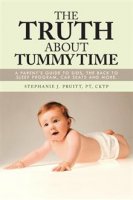 I haven't read the book myself, but was thrilled to find this review of The Truth about Tummy Time: A Parent's Guide to SIDS, the Back to Sleep Program, Car Seats and More by pediatric physical therapist Stephanie J. Pruitt. It's about time someone from the medical profession admitted that Back to Sleep has led to a significant rise in physical problems and developmental delays in our children.
I haven't read the book myself, but was thrilled to find this review of The Truth about Tummy Time: A Parent's Guide to SIDS, the Back to Sleep Program, Car Seats and More by pediatric physical therapist Stephanie J. Pruitt. It's about time someone from the medical profession admitted that Back to Sleep has led to a significant rise in physical problems and developmental delays in our children.
What I find especially interesting is that Back to Sleep is only part of the problem. See this article, Shackles for Babies, particularly the comments that follow from another pediatric physical therapist. Babies are being left on their backs during the day as well as at night, despite the known value of "tummy time." What's much worse, many are kept for hours on end in baby entertainment devices and rigid baby carriers that keep them in unnatural positions and do far more damage than leaving them on their backs, but free to move. Scary.
Even the strictest adherents of Back to Sleep can make a point of giving their babies freedom to move the rest of the hours of the day.
We love having folks over for dinner: good conversation, a chance to catch up, the opportunity to fix dishes that don't work well for two people, and an excuse to make desserts—not to mention inspiration to stop procrastinating on various indoor and outdoor work that needs to be done! The folks who came last night are the best kind, those who cheer the meal with enthusiasm, whether it's an experimental, untested recipe, an old favorite, or plain comfort food.
Raclette is Swiss comfort food. More popular even than fondue in Switzerland (according to my favorite authority on All Things Swiss), raclette is an easy meal (at least it is if you don't spend all day on the above-mentioned procrastinated projects). In Switzerland it's even a budget meal; sadly, raclette cheese is a gourmet item here, but well worth it for a festive occasion. I made the meal still more festive by choosing the colorful and flavorful Celebration Blend from Potato Inspirations; interesting potatoes are another food common in Europe but a specialty product here.
This is where Swiss purists should stop reading. Instead of the traditional pickled onions and cornichons, we served steamed zucchini and yellow summer squash. To my prejudiced American mind, that's a healthier as well as tastier accompaniment. And we had cherry crisp with vanilla ice cream for dessert.
Good food, better company. We should do this more often. There are still more projects to be accomplished....
Note: Raclette, the Sequel will be performed sometime during the first two weeks of May.
Permalink | Read 2963 times | Comments (3)
Category Everyday Life: [first] [previous] [next] [newest]
The world lost a wonderful writer today, though at 98 you can hardly say she died young. Dora Jessie Saint, aka Miss Read, was one of my favorite authors. Her stories, almost all depicting English village life, were written between 1955 and 1996. As you can imagine, there was a great deal of societal change over those years, and Miss Read did not ignore it, but demonstrated that good character and old-fashioned virtues never change.
Her stories are not exciting, they have little action and less plot. Yet they are delightful, a refreshment to the soul, like a long walk through the countryside with spring all around, or a cool breeze through a garden on a warm summer day.
Miss Read has been described as the Jan Karon of England. I enjoyed reading the Mitford books, but that comparison is wrong on so many levels. Not only do Fairacre and Thrush Green predate Mitford by decades, but as a writer Miss Read is immeasurably the superior.
(H/T to DSTB for the news.)
Permalink | Read 2723 times | Comments (0)
Category Random Musings: [first] [previous] [next] [newest]
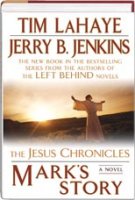 Mark's Story by Tim LaHaye and Jerry B. Jenkins (Putnam Praise, 2007)
Mark's Story by Tim LaHaye and Jerry B. Jenkins (Putnam Praise, 2007)
This, the second story in The Jesus Chronicles, is a bold, not to say brazen, attempt to show the events of Jesus' life and of the early church through the eyes of the author of the Gospel of Mark. I hadn't planned to read anything more by LaHaye and Jenkins, not after my disappointment with their Left Behind series, which had an interesting premise but could have used writers who were as serious about the story they were crafting as they were about the message they wanted to get across. As I've said before, great writers manage to convey many messages through their works, but people who start writing with a message in mind tend to write mediocre novels. But Mark's Story was recommended by a friend whom I respect, and she backed up the recommendation by lending me the book.
Tackling any part of the the Bible though the medium of historical fiction is risky, and I wondered how LaHaye and Jenkins—who so clearly reverence the Book as the written, infallable, word of God—would dare to add to what the Scriptures have to say. Well, they were smarter than me, and solved that problem—not to mention the need to get their word count up to book size—by quoting passages of the New Testament verbatim, and at length. Mark's "story" is merely the lubricant that allows the quotations to slide together into a coherent narrative.
I must say that the authors have done a credible job of piecing together the Gospels, the book of Acts, and the letters of Paul and Peter, along with what we know of early church history, while adding only enough new material to make the story flow, to show how Mark might have learned the stories he tells in his Gospel, and to get across their own biases and interpretations. The last should surprise no one who has read the Left Behind books.
Unfortunately, that much of the material is straight Scripture I actually found to be a detraction. I'd rather read the Bible itself, because—at least to someone very familiar with the facts—what is added did not give enough story to the narrative. I wasn't eager to turn the page to find out what was going to happen, and the book has none of the character development that makes me happy to re-read books I know almost by heart.
For someone less familiar with the New Testament, however, this might be a good introduction. As I said, the authors succeeded in weaving a chronological tapestry from writings that are anything but chronological. And despite my complaints, I may go ahead and read the rest of the series, just to see what they can do with the other Gospel writers. If I think of Mark's Story as one of those modern "specialty Bibles" with denominational commentary, it "works" better for me.


